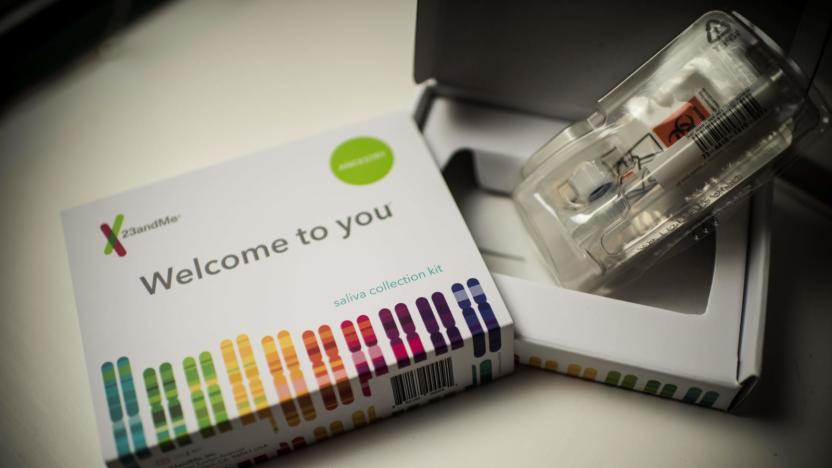genetic testing
Latest

23andMe lays off 100 workers amid shrinking demand for DNA tests
If you're skittish about DNA testing services, you're not the only one -- and it's directly affecting one of the heavyweights in the field. The 23andMe team is laying off about 100 workers, or 14 percent of its total workforce, in light of declining sales. The job cuts will focus on units responsible for growing and scaling the company. In the months ahead, 23andMe expects to cut back its work on clinical studies and focus more on its home testing and therapeutic offerings.

23andMe says gene report can detect the risk of type 2 diabetes
23andMe is betting that its gene testing kits can help identify another major health risk: diabetes. The company plans to offer a report that identifies your genetic predisposition toward type 2 (that is, adult onset) diabetes. Unlike the company's earlier reports, the test provides a polygenic score based on gene variant research data from roughly 2.5 million customers, 70,000 of which reported diabetes -- it's not relying on any public information. Ideally, this would help you change your diet and habits to reduce the chance of developing diabetes.

23andMe gets FDA approval, but only to test rare Bloom syndrome
For over a year now, 23andMe has been effectively banned from offering its US customers health-related genetic tests. The company is still selling its personal DNA kits, but the information it can provide is limited to ancestry-related reports and raw genetic data. The US Food and Drug Administration (FDA) was behind the original clampdown in 2013, but this week it's given the company its blessing for a new test. With the fresh approval, 23andMe can now offer to look for signs of Bloom syndrome, a rare disorder which is characterized by short stature, sun-sensitive skin and increased cancer risk. While this is a specific test, rather than the broader health reports it offered before, 23andMe calls it an "important first step" to offering detailed genetic advice in the US once more.

Oxford makes big push into Bigfoot research, enlists Swiss zoologists for DNA study
The search for Bigfoot continues and, no, that's not a nod to a very special episode of Unsolved Mysteries. Though Harry and the Hendersons did its best to humanize that monster of myth, a group of well-heeled European scientists are seeking to go beyond the Hollyweird fantasy to actually prove the creature's existence using advanced genetic techniques on Yeti remains. Part of a collaborative effort between Oxford University and the Lausanne Museum of Zoology, the Collateral Hominid project aims to gather material from public and private cryptozoological collections for analysis to determine whether that elusive species branched off from bears or our neanderthal forebears. Project head Prof. Bryan Sykes hopes the research, the results of which will eventually make the rounds of peer-reviewed journals, will dispel skepticism that has surrounded this controversial creature by providing " a mechanism for... identification that is unbiased, unambiguous and impervious to falsification." Basically, these real-life Mulder & Scullys want incontrovertible DNA proof that these fantastic ape-like beings are simply the stuff of evolution. Whatever the case, the truth is most certainly out there, folks -- it's just likely encased in fossilized dung. [Image courtesy Worch.com]

MinION USB stick decodes DNA in a matter of seconds
If you happen to be "special," then this $900 USB device is just about the worst thing ever. The aptly named MINion serves its masters by interrogating the cells of living organisms and rooting out their genetic secrets. We won't pretend to know exactly how it works, but it starts by pulling a strand of DNA through a razor-like nanotube that unzips the double helix. The nucleotide bases are then electrocuted one by one until they give up their code. The resulting sequence is stored like a ticker-tape readout, for the whole world to see. The MinION can complete its task in seconds and, unlike most other DNA sequencers, it's portable and simply plugs into a laptop. Luckily, it has so far only been shown to work on very short genomes, like those belonging viruses and bacteria, so for now you're probably safe.



